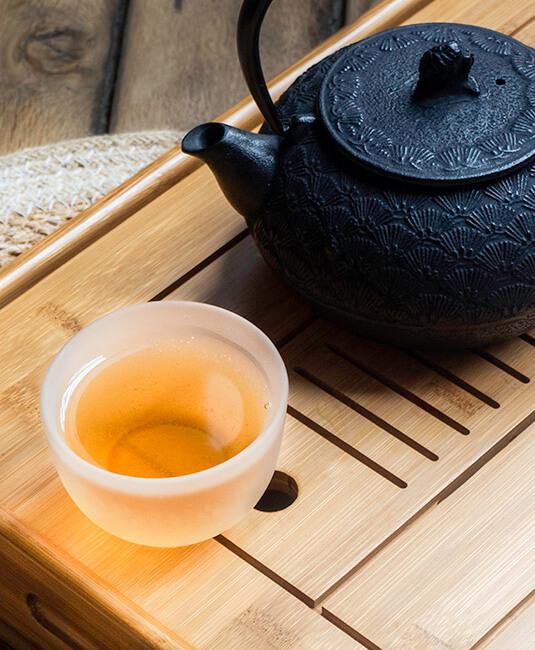
Why is tea good for your health?
Abundant scientific research highlights the myriad health advantages of tea, attributed to its diverse array of bioactive compounds. These benefits encompass a reduction in cardiovascular mortality (including lowered cholesterol and decreased atherosclerotic plaque formation, as well as artery dilation), decreased diabetes risk, enhanced bone health, and improved conditions like osteoarthritis. Tea has also demonstrated its potential to mitigate cognitive decline, including dementia and neurodegenerative diseases, and may serve as a preventive measure against certain cancers affecting the digestive system, lungs, breasts, prostate, and skin. Additionally, tea strengthens the immune system, boasts antibacterial and anti-inflammatory properties, and enhances blood circulation.
These protective effects are mainly due to the richness and diversity of its antioxidants. This antioxidant content is measured by the ORAC index: along with oilseeds, spices, cocoa and fruits and vegetables, tea has one of the highest ORACs.
Among these antioxidants, it is concentrated in flavonoids, including catechins and more particularly EGCG (Epigallocatechin Gallate) which is its major active ingredient. These substances are particularly protective for the body.
What tea is best for health?
All types of tea can be good for your health due to their richness in antioxidant substances. However, oxidation can lead to the transformation of certain oxidants named catechins into other types of less powerful antioxidants known as theaflavins and thearubigins.
Because it is not fermented, green tea is the one which not only provides the greatest quantity of protective substances, but also keeps the most powerful bioactive compounds (catechins, and especially EGCG) intact. In fact, it is tea that displays the highest ORAC index, which measures the protective capacity of a food against free radicals: 1250.
Also unfermented, white tea may have greater antioxidant capacity than green teas but due to its rarity, little scientific data is known on the topic.
What is the difference between green tea and black tea?
Unlike green tea, black tea undergoes oxidation and roasting, which leads to partial oxidation of its antioxidants such as catechins which are then transformed into other substances, and only represent 8% of the polyphenols present. Black tea, however, retains excellent antioxidant capacity, with an ORAC index of 1130, which makes it also extremely beneficial for health. It is also less rich in caffeine.

What are the benefits of rooibos?
This “red tea” - which does not actually come from the tea plant but from an African bush - naturally contains no caffeine and can be consumed even before bed. Rooibos also does not contain the tannins that inhibit iron absorption.
It is, however, rich in antioxidant polyphenols which contain numerous protective properties for health, especially concerning cardiovascular diseases, diabetes and certain cancers (prostate).
What are the benefits of white tea?
White tea is derived from tea plant buds and young leaves that have been dried but not oxidized. This process allows it to be slightly richer in polyphenols than green tea while still possessing the same protective health virtues.
What are the benefits of green tea?
Green tea offers a significant amount of protective compounds, boasting a high concentration of flavonoids, with catechins making up 70%, especially EGCG. It also exhibits an exceptionally high ORAC index of 1250. According to numerous studies, the consumption of 3 to 4 cups daily may have a protective impact against conditions such as cardiovascular diseases, diabetes, osteoporosis, cognitive decline, and specific types of cancer, among others.

What are the benefits of oolong tea?
Oolong tea undergoes partial oxidation, falling between the spectrum of green tea and black tea. Consequently, oolong tea undergoes a partial reduction in its catechin content, with the extent of this change varying depending on the degree of oxidation it undergoes. As a result, its nutritional attributes and protective qualities fluctuate in along with its oxidation level, which can range from 10% to 70%.
Is tea vegan and gluten free?
Whatever the color, tea is completely vegan(100% plant based) and gluten free. It can therefore be integrated seamlessly into diets without gluten or animal products.
What is the best tea for sports performance?
Due to its attributes, this beverage proves advantageous for athletic activities, especially green tea with its abundant catechin content.
According to an analysis of existing studies, it seems that the combination of caffeine (theine) and green tea catechins can enhance athletic performance by affecting both the brain (heightening alertness, concentration, and physical energy, reducing the perception of pain, and delaying the onset of fatigue) and muscle metabolism (amplifying the effects of carbohydrates and facilitating the mobilization of fats). Additionally, the antioxidant properties of tea may provide protection against oxidative damage caused by physical exertion.
